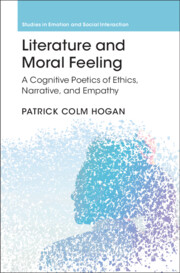Crossref Citations
This Book has been
cited by the following publications. This list is generated based on data provided by Crossref.
2023.
Emotion Communication by the Aging Face and Body.
p.
316.
Neveux, Julie
2023.
I fucking love you! Emotional address inFleabag, or how viewers’ empathy becomes voyeurism.
Journal of Literary Semantics,
Vol. 52,
Issue. 2,
p.
213.
Fernandez-Quintanilla, Carolina
and
Stradling, Fransina
2023.
Introduction: stylistic approaches to narrative empathy.
Journal of Literary Semantics,
Vol. 52,
Issue. 2,
p.
103.
Alkan, Bilal Barış
Karakuş, Leyla
and
Direkci, Bekir
2023.
Knowledge discovery from the texts of Nobel Prize winners in literature: sentiment analysis and Latent Dirichlet Allocation.
Scientometrics,
Vol. 128,
Issue. 9,
p.
5311.
Schramme, Thomas
2024.
Empathy with Future Generations?.
Topoi,
Vol. 43,
Issue. 1,
p.
29.
Hogan, Patrick Colm
2024.
Fairness, Hierarchy, and Moral Rationalization, or What's Wrong With Paradise Lost?.
Emotion Review,
Vol. 16,
Issue. 2,
p.
127.
Zheng, Yi
2024.
Prototype theory and the importance of literary form for moral imagination.
Frontiers in Human Neuroscience,
Vol. 18,
Issue. ,



